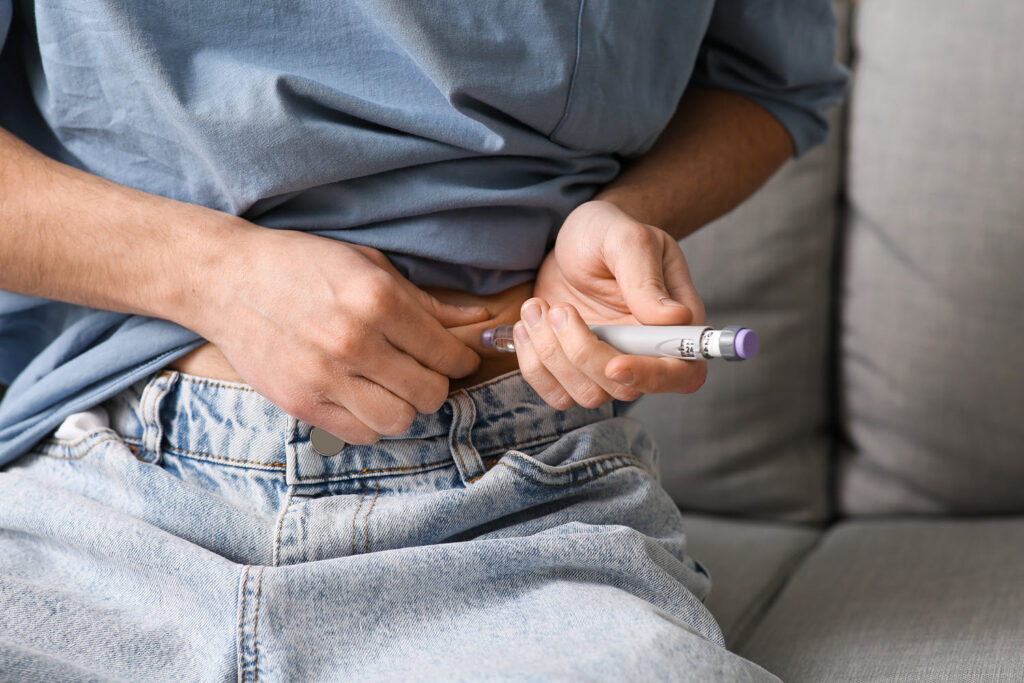Published by Dr. Brandon Richland, MD

Weight management remains a fundamental challenge for many people, especially those with obesity and related health conditions such as type 2 diabetes. Zepbound, with its active ingredient tirzepatide, emerges as a promising treatment option that addresses this issue effectively. The medication operates by reducing appetite and slowing down food’s transit from the stomach to the small intestine, helping individuals feel full sooner and for longer periods after eating.
Moreover, Zepbound’s medical efficacy extends beyond weight reduction. Its dual-agonist properties have shown to be effective in managing blood sugar levels, thereby assisting in the treatment of type 2 diabetes. Understanding proper usage and administration is crucial for achieving desired results, as it should be complemented with lifestyle changes like diet and exercise. While considering its benefits, one must also be aware of potential side effects and the importance of discussing the medication thoroughly with a healthcare provider.
Key Takeaways of Zepbound Benefits
- Zepbound is an aid in weight loss and diabetes management.
- The medication should be used alongside lifestyle changes.
- Consultation with a healthcare provider is important before starting Zepbound.
Understanding Zepbound and Tirzepatide
Zepbound represents a new horizon in the fight against obesity (excess weight), harnessing the scientific advancements in tirzepatide’s dual action mechanism.
Scientific Background of Tirzepatide
Tirzepatide stands as a novel treatment modality in the category of incretin mimetics, functioning through the harmone pathways of both GLP-1 (Glucagon-like peptide-1) and GIP (Glucose-dependent insulinotropic polypeptide).
These hormones play crucial roles in regulating blood sugar and metabolism. Notably, through these dual pathway actions, tirzepatide doesn’t just control blood glucose levels but also aids in weight reduction, making it a significant pharmaceutical stride for individuals struggling with obesity.

Zepbound as a Brand
Zepbound is the brand name under which Eli Lilly markets the drug tirzepatide. It was greenlit by the FDA as a weight loss medication, reflecting the regulatory confidence in its efficacy and safety profile. Zepbound is administered through once weekly injections, offering convenience compared to the more frequent dosing of some alternatives.
Benefits for Weight Management
Zepbound has shown to be a pivotal development in aiding individuals to achieve and maintain a healthier weight. This medication’s benefits manifest in several key aspects of weight management, creating a comprehensive support system for those dealing with overweight or obesity.
Impact on Body Mass Index (BMI)
Zepbound’s efficacy can be particularly observed in its ability to significantly lower body mass index (BMI) in numerous patients. A reduction in BMI is a critical factor in moving their figures from the overweight or obese categories into healthier ranges. This plays a crucial role in reducing the risk of weight-related health issues.
Long-term Weight Reduction Success
One of the standout benefits of Zepbound is its potential to aid in long-term weight reduction success. Patients may experience a sustained loss of weight, which is vital because long-term maintenance can be just as challenging as the initial weight loss journey.
Enhancing Physical Activity and Dietary Choices
Zepbound may not only help suppress appetite and manage hunger, but also supports patients in adhering to a reduced-calorie diet and increasing physical activity. These lifestyle changes are essential for weight loss and have been shown to be more effective when paired with anti-obesity medications.
Medical Efficacy for Type 2 Diabetes
Zepbound, also known by its generic name tirzepatide, has been recognized for its role in managing Type 2 Diabetes. It assists patients by effectively regulating blood sugar levels and has potential in preventing diabetic retinopathy.
Blood Sugar Regulation
Zepbound engages in the regulation of blood sugar by mimicking incretin hormones, which are natural hormones that manage insulin release in response to food. Patients benefit from its ability to maintain steady blood sugar levels, thereby reducing the risks associated with hyperglycemia. Clinical trials have demonstrated that tirzepatide significantly improves glycemic control in individuals with Type 2 Diabetes.
Diabetic Retinopathy Prevention
Although the primary purpose of Zepbound is to control blood sugar levels, it may have a secondary benefit in preventing diabetic retinopathy, a serious complication of diabetes that can lead to vision loss. Stable blood sugar levels decrease the likelihood of damage to the small blood vessels in the retina, thereby safeguarding patients’ vision.
Comparative Efficacy with Other Medications
When compared with other diabetes medications, the efficacy of Zepbound is notable:
- Metformin: Often the first-line medication for Type 2 Diabetes, metformin works by reducing glucose production in the liver. Tirzepatide may be more effective in lowering blood sugar levels when metformin alone is insufficient.
- SGLT-2 inhibitors: These medications work by preventing glucose reabsorption in the kidneys. Zepbound could be more beneficial for patients needing additional glycemic control beyond what SGLT-2 inhibitors provide.
- Sulfonylureas: These stimulate insulin secretion from the beta cells of the pancreas, but can increase the risk of hypoglycemia. Tirzepatide generally poses a lower risk of this adverse effect while being highly effective in blood sugar management.
Usage and Administration
Before administering Zepbound, it is crucial to understand the dosage recommendations, proper injection technique, and how to manage missed doses to ensure the medication’s effectiveness and safety.
Dosage Guidelines
The dosage of Zepbound is individualized based on the patient’s medical condition and response to treatment. It is typically administered once weekly via a subcutaneous injection. Patients should follow their healthcare provider’s instructions on when and how to increase the dosage.
- Starting Dosage: Begin treatment with the recommended starting dose.
- Maintenance Dosage: Adjust the dose gradually based on therapeutic response.
Injection Technique and Site
Zepbound injections are subcutaneous, meaning they are administered just under the skin. Patients should be instructed on proper injection techniques to minimize discomfort.
- Preferred Sites: The abdomen, thigh, or upper arm.
- Rotation: Rotate the injection site with each dose to reduce the risk of lipodystrophy.
Managing Missed Doses
In the event that a dose is missed, patients should be guided on the appropriate steps to take, which helps maintain the dosing schedule’s integrity.
- If a missed dose is realized within three days of the scheduled dose, instruct patients to administer it as soon as possible.
- If more than three days have passed, the patient should skip the missed dose and return to the regular dosing schedule.
Potential Side Effects
When considering Zepbound for managing certain health conditions, it’s essential to be aware of the potential side effects that may occur. While many people tolerate the medication well, some may experience adverse reactions ranging from mild discomforts to serious health risks.

Common Adverse Reactions
The most frequently reported side effects of Zepbound include gastrointestinal issues such as nausea, diarrhea, vomiting, and constipation. These effects are typically temporary and may resolve as the body adjusts to the medication over time. Other common reactions patients might experience can include indigestion and stomach pain.
Serious Health Risks
More severe but less common side effects may include pancreatitis, a serious inflammation of the pancreas; an allergic reaction that can manifest as itching, rash, or difficulty breathing; and gastroparesis, a delayed emptying of the stomach which can complicate diabetes management.
It’s also important to be mindful of potential injection site reactions, which can cause redness, swelling, or pain at the site where the medication was administered. The serious side effects of Zepbound necessitate prompt medical attention.
Minimizing and Managing Side Effects
There are strategies one can employ to help minimize or manage the side effects associated with Zepbound. Starting with a lower dose and gradually increasing may help alleviate gastrointestinal discomforts. Staying hydrated and eating small, bland meals can also ease nausea and vomiting.
It’s critical for patients to closely follow the guidance of their healthcare provider to both reduce potential side effects and ensure the effectiveness of the medication.
Precautions and Contraindications
When considering Zepbound for weight management, it is crucial to understand the necessary precautions and recognize any contraindications to ensure safe use.
Special Populations and Zepbound
- High Blood Pressure: Individuals with high blood pressure should monitor their condition closely, as weight loss medications can affect blood pressure levels.
- Allergic Reaction: Patients should be aware of any personal or family history of severe allergic reactions and discuss this with their healthcare provider before receiving Zepbound.
- Kidney Problems: As the kidneys play a role in filtering medications, those with pre-existing kidney conditions need to proceed with caution and may require dose adjustments or more frequent monitoring.
- Thyroid Cancer and Other Thyroid Conditions: Zepbound carries a warning regarding the risk of thyroid C-cell tumors. It is contraindicated in individuals with a personal or family history of medullary thyroid carcinoma or in those with Multiple Endocrine Neoplasia syndrome type 2.
Interactions with Other Drugs
- Drug Interactions: Zepbound may interact with other medications, which can alter its effectiveness or increase the risk of adverse effects. It is particularly important for individuals who are on medications for chronic conditions to have their regimens reviewed by a healthcare professional.
- A detailed review of current medications should be conducted to identify any potential interactions before starting Zepbound therapy.
Clinical Research and Approvals
Before a new drug like Zepbound can hit the market, it must go through rigorous clinical research and regulatory approvals. This process ensures the medication’s safety and efficacy for weight management in humans.
FDA Approval Process
The U.S. Food and Drug Administration (FDA), a key regulatory entity, rigorously evaluates new medications. Eli Lilly and Company submitted Zepbound, generically known as tirzepatide, for review.
The approval process involves several stages, including the examination of clinical trial data, the drug’s safety profile, and the verification of manufacturing practices to ensure the drug’s quality and consistency.
Key Studies and Trial Outcomes
Clinical trials for Zepbound were comprehensive, involving placebo-controlled methods to assess the drug’s effectiveness in chronic weight management. The primary outcome measured was the percentage of body weight change from baseline:
- Comparison: Zepbound vs. placebo
- Participant demographics: Adults with obesity or overweight
- Duration: 36-weeks
- Results: Zepbound achieved superior mean percent change in body weight compared to placebo.
Eli Lilly and Company’s release of Zepbound is marked as an important development in obesity treatment, being the first to activate both GIP and GLP-1 hormone receptors.
Frequently Asked Questions About Zepbound Benefits
1. What Advantages Does Using Zepbound For Weight Loss Offer?
Zepbound is designed to help lose weight by mimicking certain hormones that can help decrease appetite and improve blood sugar control.
2. Can You Explain The Side Effects Associated With Taking Zepbound?
Like any weight loss drug medication, Zepbound can have side effects, which may include gastrointestinal issues such as nausea or vomiting.
3. How Is Zepbound Different From Similar Medications Like Mounjaro?
While both Zepbound and Mounjaro are GLP-1 receptor agonists used for weight management, they may differ in their composition and the specific formulation of the active ingredient, tirzepatide.
4. What Is The Typical Cost For A Monthly Supply Of Zepbound?
The cost of Zepbound can vary widely based on insurance coverage and other factors. For accurate pricing, patients should check with their healthcare provider or pharmacy.
5. How Does Zepbound Work In Our Body For Weight Control?
Zepbound works by enhancing the body’s natural ability to regulate appetite and insulin, which leads to reduced food intake and better blood sugar levels, contributing to weight loss.
6. Are There Any Dietary Or Lifestyle Changes Recommended When Starting Zepbound?
Healthcare providers often advise making dietary and lifestyle adjustments in conjunction with taking Zepbound to maximize weight loss results. This might include a balanced diet and regular physical activity. For specific recommendations, it’s best to consult a healthcare professional.

Conclusion and Summary of Zepbound Benefits: Losing Weight Efficiently
Zepbound represents hope for many struggling with obesity and related health issues. Its introduction into the market as a FDA approved Zepbound reflects the ongoing commitment to developing safe and effective treatment options.
By understanding the full scope of its benefits and risks, and integrating it with necessary lifestyle modifications, individuals can embark on a journey to healthier lives, armed with one of the most advanced weight loss drugs available.
As with any medication, a detailed discussion with a healthcare provider is essential to navigate the path to wellness with Zepbound, tailoring the treatment to individual needs and ensuring the best possible outcomes.
Please note that this article is intended for informational purposes only and should not be construed as medical advice. Before making any changes to your treatments, please consult with your healthcare provider to discuss the appropriateness and safety of such changes.
Ready For Your First-Class Cosmetic Experience in Orange County (OC) California (CA)?
Are you located in one of these Orange County (OC) / Southern California cities?
Aliso Viejo, Anaheim, Brea, Buena Park, Costa Mesa, Coto de Caza, Cypress, Dana Point, Fountain Valley, Fullerton, Garden Grove, Huntington Beach, Irvine, La Habra, La Palma, Laguna Beach, Laguna Hills, Laguna Niguel, Laguna Woods, Ladera Ranch, Lake Forest, Los Alamitos, Mission Viejo, Newport Beach, Orange, Placentia, Rancho Santa Margarita, San Clemente, San Juan Capistrano, Santa Ana, Seal Beach, Stanton, Tustin, Villa Park, Westminster, or Yorba Linda?
Plastic Surgeon Dr. Brandon Richland, MD and our Cosmetic Aesthetics Team are ready to help you look and feel your absolute best.
Elevate your confidence and self esteem levels to unfathomable new heights!
Schedule your in-person consultation in our modern and luxurious offices in either Fountain Valley, CA (Main HQ) or our Newport Beach, CA office.
Do you live outside of Southern California or short on time? For your convenience, Virtual Consultations are also available.
Our warm and engaging Team of carefully selected Aesthetics Professionals will make you feel calm, cool, collected, and right at home throughout your entire consultation and surgery process.
Schedule Your Aesthetics Consultation here, or call us directly at 949-867-4496 today.
About the Author

Dr. Brandon Richland, MD is a respected Board Certified Licensed Plastic Surgeon in Orange County / Southern California specializing in cosmetic and reconstructive surgeries.
Driven by his passion for medicine, Dr. Richland obtained his Doctor of Medicine (M.D.) degree from the prestigious program at Saint Louis University (SLU) School of Medicine in 2013. His exceptional skills were recognized when he received the McGraw Hill / Lange Medical Student Academic Achievement Award, and graduated top of his class with Honors. For his undergraduate degree, he attended University of California, Los Angeles (UCLA) and graduated with Honors in 2009.
To further enhance his surgical expertise, Dr. Richland completed his Residency in Plastic Surgery at the University of California, Irvine (UCI) from 2013 to 2019 earning the Academic Achievement Award twice during this period. A total of 14 years in dedicated schooling and medical residency.
Dr. Richland is actively involved with healthcare and medical societies, as a Diplomate of the American Board of Plastic Surgery, a member of the American Society of Plastic Surgeons, American Society of Aesthetic Plastic Surgeons, and the California Society of Plastic Surgeons.
Contact Dr. Richland today by visiting RichlandMD.com, scheduling a cosmetic consultation, or by calling 949-867-4496 directly.
Cover Image Credit: Standrets / 123RF.com (Licensed). Photo Illustration by: Dr. Brandon Richland, MD.










